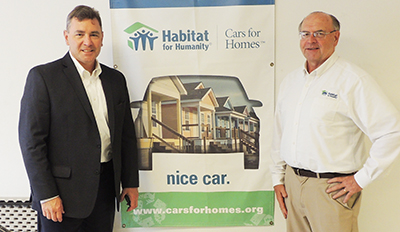
DCED Secretary Dennis Davin (left) alongside Habitat for Humanity Executive Director Michael McElhaney (right) as they discuss the projects Habitat for Humanity has been able to complete and work on with the help of the Neighborhoods Assistance Program.
by KP intern Kyle Predmore
On Friday, Department of Community And Economic Development (DCED) Secretary Dennis Davin visited two state-supported programs that increase access to food and affordable housing in Kittanning. The two areas Davin toured included the Armstrong County Community Action Agency and the Armstrong Habitat for Humanity. Both programs are supported by the Neighborhood Assistance program (NAP), which encourages business to make investments in community development projects.
“The state of Pennsylvania is unable to fund non profits directly,” Davin said. “The DCED will provide a tax credit to the company based upon the amount of funding they provide to Habitat for Humanity, so Habitat will get the funding for their projects, and the company receives a tax credit. In that program we use throughout the state.”
Through the support of the NAP, DCED coordinated with Snyder Associated Companies, Inc., NexTier Bank, Northwest Bank, Thomas R. Harley Architects, and Bradigan’s Heating & Air Conditioning to make $274,000 in funding available to Armstrong Habitat for Humanity.
“The amount we received this year was a significant amount more than what we’ve been able to get compared to previous years,” Habitat for Humanity Executive Director Michael McElhaney said. “We received $40,000 last year and the year before that we received $25,000.”
“It’s a great program because these companies and businesses than can invest back into their community and make a difference,” Davin said. “It’s good for everybody. These donating companies get a tax credit, they’re essentially putting money into their communities and the people benefit from the rebuilds and touchups.”
Habitat for Humanity is a non-profit organization that helps families build and improve places to call home. They do a lot of volunteer work around the area and with the amount of funding they are able to get, the amount of output will also increase.
“We’ve done something called “rock the block” where we will try to work on 20 houses in a day toward owner-occupied exterior fix up,” McElhaney said. “So if you apply for it, we will do things like paint your porch or fix your plants. Now we’re in the sidewalk business. If there are sidewalks that need to be repaired, we can do that as well.”
Outside of touchups, Habitat for Humanity will purchase and own a property, the property becomes tax-exempt, fix it and then find suitable owners for the home.
“We interview families who qualify to be homeowners, McElhaney said. “It takes about a year to work on a home and they have to take courses on how to manage finances. Then the approved owners put in sweat equity. That’s their down payment. They get a house, they’re paying 400 or 500 a month and there’s no interest.”
“There’s a lot of data if you look at it when there’s solid home ownership you see better health, more attendance in school, more going into secondary school, there’s less crime, there’s all these positive things around solid home ownership,” McElhaney added.
Five years ago, Habitat for Humanity was able to restore and sell around 1 house every 4 years. This year, the organization is ahead of schedule, claiming 4 houses completed with over 25 “Brushes of Kindness”.
“’Brush of Kindness’ is a program we run where you own the house, but we will do fix ups” McElhaney said. “We will do things like sidewalk painting, porch repair, handicap access and we do a lot of roofs.”
Working with Kittanning Code Officer Rick McMillen, McElhaney has been able to find places that are in rough shape, and are able to own the property so it can be fixed and sold as part of the program. Where the organization is ahead of schedule, they have a list of over 12 houses they are able to work on in the future, but also have to ensure they own the property before any work can be started.
“There are many ways to volunteer,” McElhaney said. “We have youth groups that will come and so special projects and have adult groups as well. We have colleges that will come out and spend a week with us. There are many ways to help and we are also connected to different churches as well.”
